The two interviews I have done with Dave Scott have both been a lot of fun. His forthcoming nature and willingness to share his opinions on all topics make these discussions both fascinating and informative.
Hear from one of our sport’s greatest in the videos below or the article below that.
2019 Interview
We caught up with Dave Scott to talk about his first triathlon, nutrition, and how he at 13 grilled cheese sandwiches in one sitting. That’s below
Also, find out what he’d say to Jan Frodeno’s face.
If you want to work with Dave directly, he’s offering a free 12 week plan via the Dave Scott Triathlon Club (DSTC).
The Dave Scott Triathlon Club is the exclusive high-performance community of 6x IRONMAN World Champion and Master Coach Dave Scott. Members receive a free 12 week training plan, access to special programs and videos, discounts on Dave’s gear, priority registration for Dave’s camps and access to Dave via live webinars and the community forum with their membership. Dave would like to increase membership in 2020 to 1000 members.
Click here to get started.
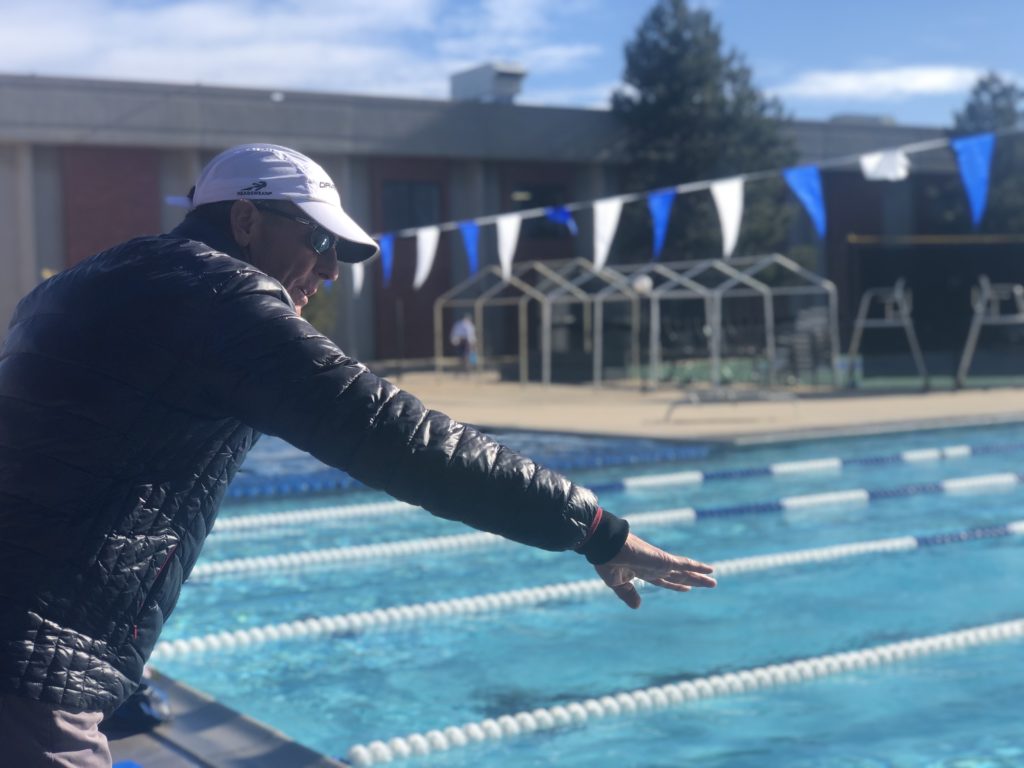
You don’t need much of an introduction but for those new triathletes that may not have heard of you, how would you introduce yourself?
I’m a middle-aged guy who still tries to stay active. Did my first race in ‘76, developed a passion for swim-bike-run and seemed to have a hidden ability to preserve. People know me as the 6-time Ironman World Champion. People know me as an athlete but I’d like to be thought of as a teacher or coach – my dad, as a professor, must have planted that seed in me. I thought it was just a side-line, not a profession, that I was going to be some kind of teacher-coach. I’ve always had that passion to help people. Everyone’s a puzzle and I’m trying to make them better.
Is it true that you raced your school bus to school in the 7th grade?
Well you have done your homework. Yes, that‘s very true. I think it was about 6 miles. The bus would come by and do a loop around the housing area. I’d get on my bike as it would come by – I just had a 3 speed – and I’d wear a backpack with my books and just go as hard as I could.
There was a little overpass as I’d come into the town of Davis, and I thought that gave me an advantage, coming down that. Most of the time I could beat it; I was always instilled with an athletic fire.
I’d always play these mental games by myself – I didn’t need to be pushed. I had a deranged psyche and realized I could keep pushing myself!
Were you always a cyclist and a runner? I know you have a strong swimming and water polo background, but how did you get into the other two sports?
As a youth I wasn’t in the track club, and there were no cycling clubs. I lived in a hot place, Davis, California, and I joined the local swim team. That was our foundation. It was really seasonal.
And I played other sports, like basketball and American football. Then when water polo came around, I picked up that sport – I had good hands from basketball – and I became reasonably adept at it.
I was the first all-American athlete in my high school. Then I went to UC Davis. I swam seasonally but never swam year-round. I have a real rough stroke. I am tight in my shoulders and not so streamlined.
But my stroke is more adaptable to open water so I thrived there comparatively, and salinity always helped my body position. But as a swimmer in high school and college I didn’t have the fluidity. I was like a loose chainsaw and it kind of replicated my run form.
But Davis is a real cycling community so I would ride my bike like a maniac. And I ran in basketball in high school – ok, but never pretty. I’d run 5k in the middle of the night as fast as I could while studying for finals!
Which was your best sport when you were competing? How about today?

When I first started, swimming was my ticket, and comparatively – not being disparaging to the quality of the swimmers in the late 70s and 80s – it was my best. But as triathlon evolved my swim soon became the weakest. My bike and the run became the ticket.
The marathon on the end was probably my strong suit. In the 80s I typically had the fastest run off the bike so I always felt I would have a solid day.
You remind me of Lionel Sanders – his run may look rough but of course he’s fast.
I know Lionel and I’d say the same thing for Jan Frodeno – amazing athletes but neither has run to their capabilities in Kona. I’d say all the current men racing in Hawaii these days – none of them have run to their potential! A lot of them are 1:10 off the bike in halves so they should be running 2:30s off the bike in Kona but they’re not doing it yet!
What was your fastest off the bike? 2:45?
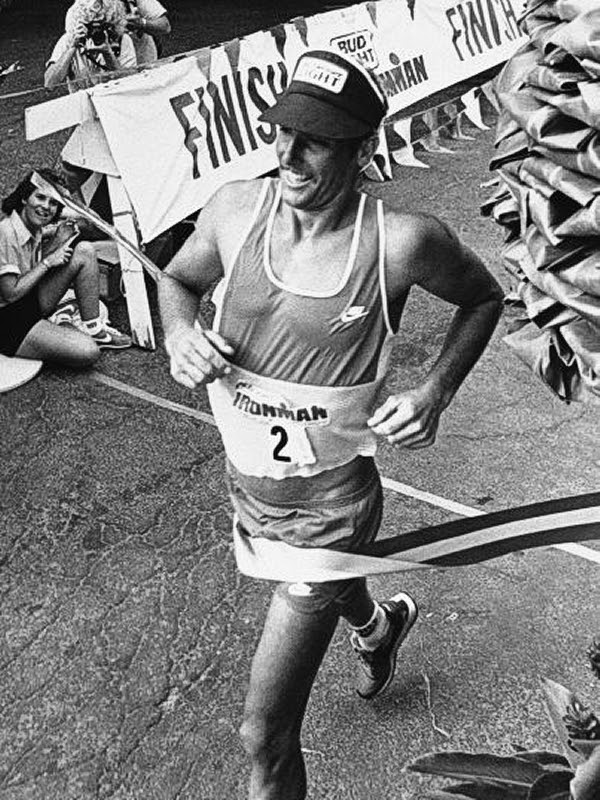
No, that was 1989 when I was 35. What was in the record books is 2:40 for Mark Allen and 2:41 for me. But that included transitions! And they didn’t have timing chips back then. So, the real times would have been more like 2:38 for Mark and 2:39 for me.
Coming back to the beginning – when did you first hear about triathlon? What was your first race? I read it was the Turkey Triathlon in November 1976 in San Francisco? How did you do?
At the time, I was still in college, coaching a masters swim team. There were a lot of events – run-swim and bike-swim around at the time. There was this one in San Francisco – I said why don’t we go do this event? It didn’t have a name, but yes, it was November of ’76.
It was in the San Francisco Bay in November and the water was only 13 or 14 degrees centigrade. Scott Tinley came to that race and we had the swim at the end!
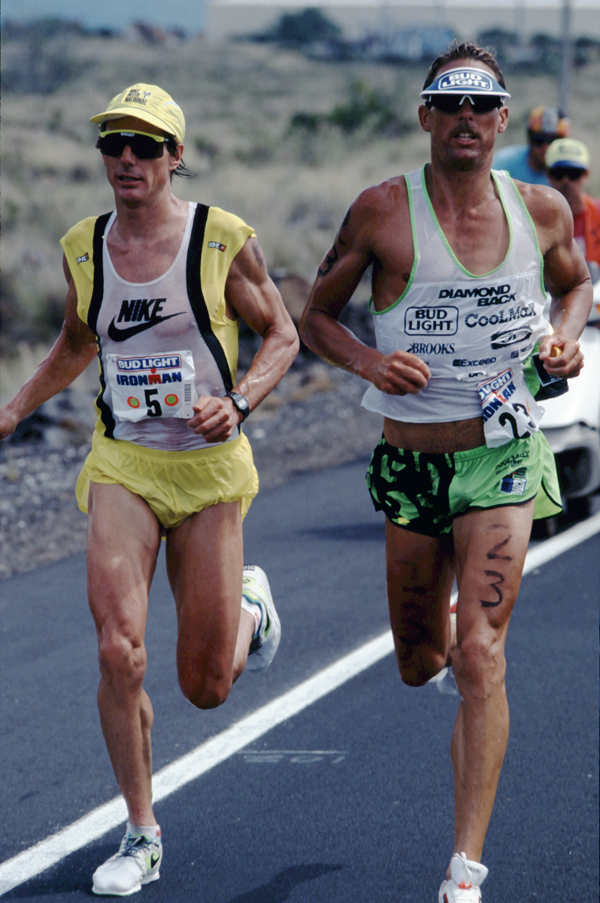
Do you ever race today? What would it take to get to you to compete again?
Andrew, in my mind I race every day of my life! I’m very competitive. I still train hard on a daily basis. My background is exercise physiology, so I understand how the body adapts with stress. Unfortunately, I now have a heart arrhythmia called atrial fibrillation. I had atrial flutter and atrial fib simultaneously three and a half years ago.
The cardiologist performed an ablation which took care of the flutter. I had a second exploratory ablation for the Afib, which lasted seven hours, but I’m still plagued with this arrhythmia.
I still have it. When I train, particularly swimming, my ability is 30% less prior to the arrhythmia issues. The run and bike are both compromised.
On the bike I have a little more staying power but once my heart rate goes up my arms and legs feel heavy so I’m not getting the big profusion of blood in my limbs.
The sensation is feeling like my body is in a vice and I have the inability to take a deep, fulfilling breath.
I still get in the pool and try to hold off the fast people. I rode this morning and it was minus 4 C and nobody else was out.
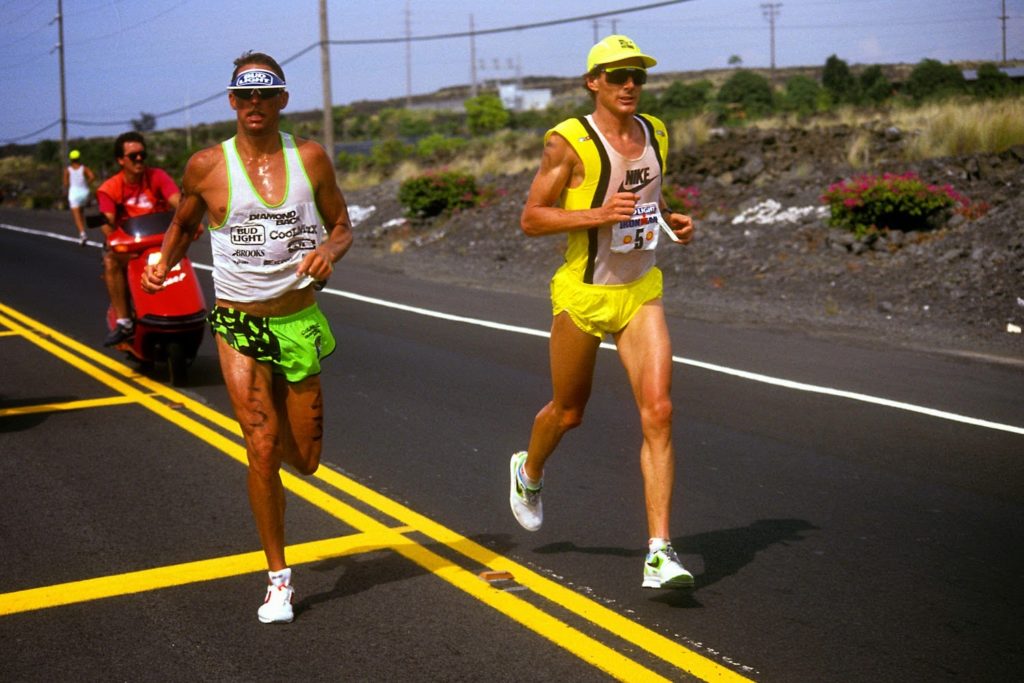
What is your nutrition plan? How has it evolved over the years? Weren’t you a vegetarian for a while?
Yes, very true, it has evolved over the years. I was in Australia a few years ago and I gave talks and clinics – I’ve done a lot of these – and I talked about carbs and fluid replacement, and more.
The other side is eating a healthier way of lower carbs and healthy fat and it’s more accepted now.
I love science, always have, and have given a number of clinics and talks in this nutritional area. The conventional wisdom was that we should eat those carbs and you’ll be a rocket.
A high-carb diet increases inflammation and accelerates aging. A number of athletes feel they are immune to potential health issues related to diet. Being naive or a great athlete is not an excuse.
So yes, my nutrition advice has changed over the years. But I can stand up in front of an audience and say the dietary info I gave was wrong.
You really need to cut out your very simple refined carbs, gummy bears, grains, and all the clear oils should be cut out, they have a terrible effect on your cell membranes.
Cold water, deep water fish, olives, butter, cheeses and non-starchy vegetables. These foods should be on your AAA list.
Would you say the Low Carb High Fat (LCHF) diet applies to everybody?
Most of the studies dispute LCHF because the subjects were not on the diet for a long enough time period. People try it for a few weeks and don’t like it because their bodies still haven’t adapted.
When you’ve been doing it the other way 30 or 40 years it’s a transitional phase. Shifting to LCHF causes a flushing of water due to the low intake of carbohydrates. Changing your electrolyte levels by increasing sodium, potassium and magnesium with LCHF is paramount during the transition.
If you do this for only 2-4 weeks there may not be any adaptation and the time period needs to be longer. We can produce ketones quickly and they provide energy to your brain and muscles but you don’t have the potential inflammation you get from carbs. There will be a huge change from going to 400-500 g of carbs a day down to 50.
The adaptation phase takes 4-6 months! Your recovery will be better but people think if I eat fat, I will get fat, but that’s a misnomer with a bit of ignorance and a whole bunch of arrogance. Really, it’s a phobia but people say I want to be better but I don’t want to do this. So, don’t take out saturated fats, reduce your carbs.
Tell me a bit about SFules and your role with them.
We just did a few recorded webinars. The whole premise is a lifestyle approach – with products throughout the day. LCHF is not as severe as a keto diet. You have an unlimited number of types of foods – I have all the vegetables you can eat, not the starchy ones, but an endless list, grass-fed beef, not farm raised anything, tuna, mackerel, sardines, and all that cold-water fish.
Most people say, ‘I can’t eat what I like anymore.’ That’s not true! They might not know you can make pancakes out of almond flour!
At SFuels we talk about all of this and how to make the transition, and what the pitfalls are. We don’t talk about it with a bed of roses, but what the lifestyle changes are and how you integrate this into your training and how much and what types of foods you need.
And if you are carb adapted you turn OFF the glucose switch and turn off ON the ability to oxidize fats. It’s a cleaner fuel and long-term fuel.
I guess the days of rinsing the fat out of your cottage cheese are over. [Dave was famously known for doing this.]
[Laughs] that comes up every once in a while!
Is it true that you once ate 8.5 lbs of ice cream in one sitting?
You sure have done your homework, Andrew. I was in college. I had 13 grilled cheese sandwiches and one sitting, too. That ice cream was at a place called Farrell’s. It was a huge serving of ice cream with caramel and butterscotch and more and some people try to eat it all by themselves.
My roommate said I could do it and I tried, and I did it. At the end there was a disgusting pool of mixed sauces on the bottom.
Do you work with Dan Plews? [Kona 2019 age-group champion].
Yeah, Dan is a nice guy, well researched and a good guy to collaborate with on SFuels.
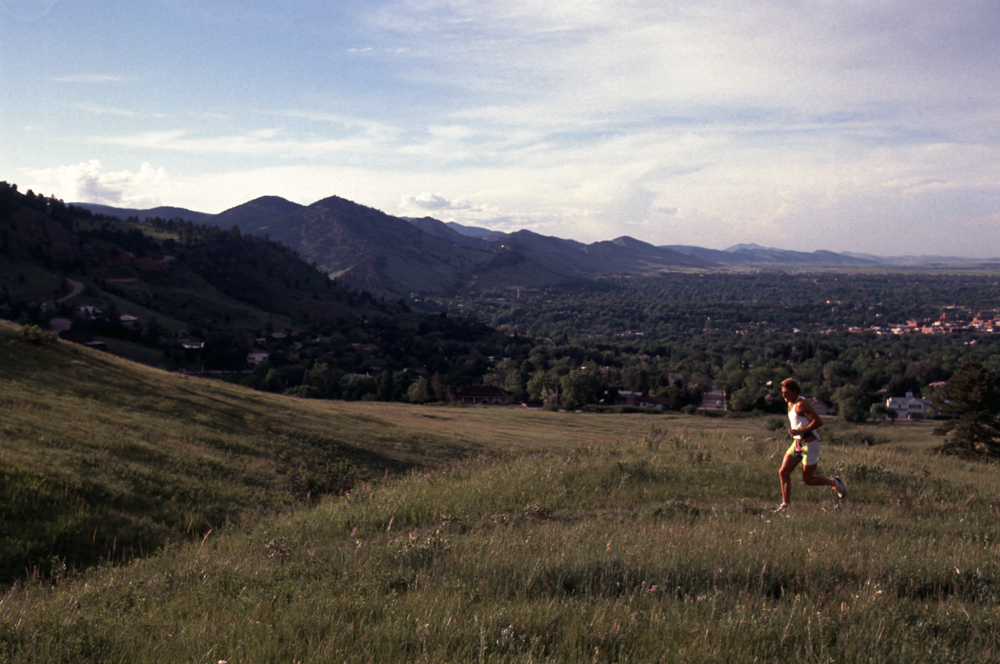
Have you seen the Netflix movie Game Changers? What do you think of it?
I don’t have a desire to see it, but I hear about it every day. I talk lot about vegetarian diets and the pros and cons of them, and I know the film is slanted. I was vegetarian once but I said I’m not getting good quality omega 3s. Now there’s a pescatarian which is much healthier, or lacto-ovo, with milk and eggs, and that’s a good thing to do.
It’s true that a lot of athletes perform well on a vegetarian diet but I think it’s void of a lot of areas. Many of those athletes may have low zinc, B-12, iron and other things.
Who are some triathletes you think we should be watching today? Who is your favorite?
Who we should be watching re the ones we are watching! I don’t have a favourite. Daniela Ryf has done well. Lucy Charles is great too. I like the venom in her and she’s tough as nails. They’re remarkable.
Jan is cool and calm and has a good engine to win. Look what he’s done. But he hasn’t mastered Ironman Hawaii yet. And I’d say this to his face: He hasn’t run fast; he needs to run fast!
Gómez, Alistair, I admire them too. I’ve always liked Brownlee’s fire. I’ve always liked him. He’s a no-nonsense guy and I think there is no athlete racing against him that doesn’t have that mindful respect of him. Gómez is a tough guy and remarkable too.
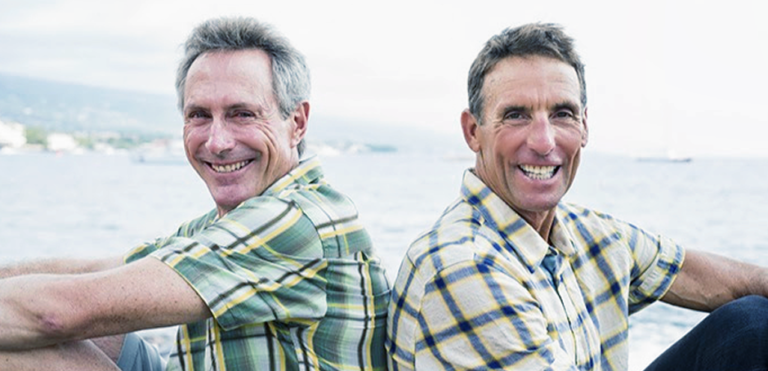
Finally, what Ironman hacks can you give our readers?
At the race, right? People should have a mental roadmap of the race, not equidistant, but where the false flats are, windy sections, turns on the swim, landmarks to look at, and more. Know the course.
Have this mental roadmap and break the race up into races. Don’t look at the full race. Look at the mini races in it and quantify how to get there up around that corner or over that hill.
Another tip is to always have a physical inventory of what your body is doing at all times. Relax your face, then your neck, your back, down your legs, your arms, your toes. Do that three to four times. That creates a calmness. We do that in training but don’t realize it.
In a race we have tendency to overwork the niggling things that come up. You start thinking things like ‘my legs are heavy’ and when we start thinking that things are going to get hard, then yes, your legs are really going to be heavy really soon.
I say do what you can do at the moment and when people start forecasting 2km ahead, don’t do that, stay present, get ease and calmness and don’t get mentally wrapped up in what’s ahead.
They always used to say ‘Dave Scott likes bad conditions.’ It’s not that I like bad conditions, but if I know it’s going to be windy at Kona, I deal with it and accept it.
Follow Dave online:
Other interviews:
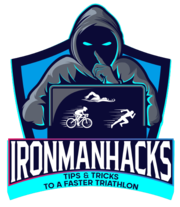














Leave a Reply
You must be logged in to post a comment.